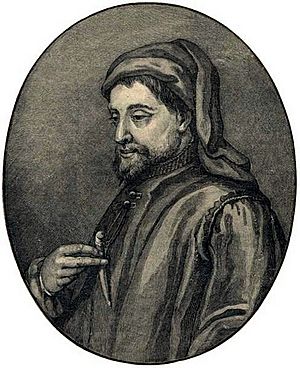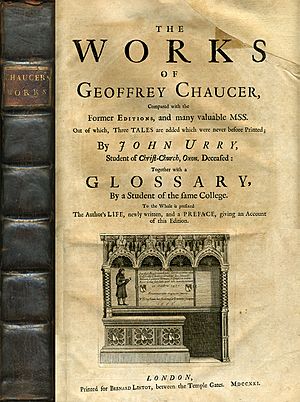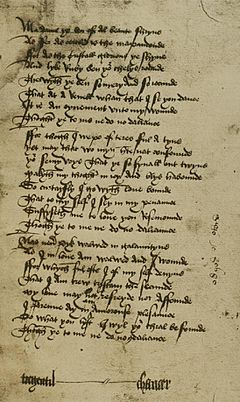Geoffrey Chaucer facts for kids
Quick facts for kids
Geoffrey Chaucer
|
|
|---|---|

Geoffrey Chaucer - Illustration from Cassell's History of England, 1902
|
|
| Born | c. 1340s London, England
|
| Died | 25 October 1400 (aged 56–57) London, England
|
| Resting place | Westminster Abbey |
| Occupation |
|
| Era | Plantagenet |
| Spouse(s) |
Philippa Roet
(m. 1366) |
| Children |
|
| Parents |
|
| Signature | |
 |
|
Geoffrey Chaucer (born around 1343, died October 25, 1400) was a famous English writer, poet, and thinker. He is most famous for writing The Canterbury Tales. This book has 24 stories, but he never finished it.
Chaucer was one of the first writers to use English. He wrote in a language called Middle English. People often call him the "father of English literature" or "father of English poetry". He was the first writer buried in Westminster Abbey in a special area now called Poets' Corner. Chaucer was also known as a philosopher and astronomer. He even wrote a science book, A Treatise on the Astrolabe, for his 10-year-old son, Lewis. He worked for the government as a bureaucrat, a royal helper, a diplomat, and a member of parliament.
Contents
Early Life
Chaucer was probably born in London, England. His father, John, and his grandfather were successful wine merchants in London. The name Chaucer is French and means "shoemaker." We do not know many details about his early life or schooling.
Around 1357, Chaucer worked as a page for Elizabeth, Countess of Ulster. She was the wife of Lionel, the Duke of Clarence. In 1360, French soldiers captured him near Reims during a battle. This was part of the Hundred Years' War. King Edward III helped pay £16 for his release.
Chaucer married Phillipa (de) Roet. She was a lady-in-waiting to the queen. Her family was also close to John of Gaunt. Chaucer and Phillipa had about three or four children.
Working for the King
Chaucer might have studied law in London. He joined the Royal court and traveled around Europe. He went on important trips for the king. He became one of the king's esquires, which was a special attendant.
One of his first known poems was written in 1369. It was called The Book of The Duchess. He wrote it after John of Gaunt's wife, Blanche, died. In 1374, Chaucer became the Comptroller for the Port of London. This meant he was in charge of money for customs. He did this job for 12 years. It was a good job, and Chaucer became quite rich.
When Richard II became king, Chaucer kept his job in Customs. He also went on several more diplomatic trips to Europe for the king.
Life in the Country
In 1385, Chaucer moved to Kent. He got a new job as a Justice of the Peace there. He was also chosen to be a member of parliament. He was one of two knights representing the shire. At the end of that year, he lost his customs jobs. His wife, Phillipa, died in 1387.
But on July 12, 1389, he got a new important job. He became the Clerk of the Kings Works. This meant he looked after repairs to the royal palaces. He also had other small jobs. These included looking after the river banks of the Thames and working as a deputy forester in the Royal Forest.
Death and Burial
Chaucer died on October 25, 1400. The cause of his death is not known. The only proof of this date comes from his tomb. The tomb was built more than 100 years after he died. Some people think he might have been murdered. This could have been by enemies of Richard II or even by the new king, Henry IV.
Chaucer was buried in Westminster Abbey in London. In 1556, his remains were moved to a more fancy tomb. This made him the first writer buried in the area now called Poets' Corner.
How Chaucer Changed English
Chaucer was very creative with how he wrote poems. He invented a new way of rhyming called the rhyme royal. He was also one of the first English poets to use a five-stress line. This means each line had five strong beats. He often put these lines into rhyming couplets (two lines that rhyme). This style became very popular in English poetry.
Chaucer's poems, along with those of other writers, helped make the London way of speaking English the standard. This London way was a mix of different Middle English dialects.
Today, it can be a bit hard to read Chaucer's poems. This is because the English language changed a lot after he died. This big change is called the Great Vowel Shift. It changed how many English words were pronounced. Even with different spelling, many words in Chaucer's writing are still easy to understand today.
Chaucer was also the first writer to use many common English words in his books. These words were probably used often back then. But Chaucer was the first to write them down. Words like acceptable, alkali, altercation, amble, angrily, annex, annoyance, approaching, arbitration, armless, army, arrogant, arsenic, arc, artillery, and aspect are just a few examples. He was the first to write down almost two thousand English words.
Chaucer's Main Works
Here are some of Chaucer's most important works. They are listed in the order they were probably written. But scholars still discuss the exact dates. Some collections of stories might have been put together over many years.
Major Works
- The Book of the Duchess
- The House of Fame
- Anelida and Arcite
- Parlement of Foules
- Troilus and Criseyde
- The Legend of Good Women
- The Canterbury Tales
- A Treatise on the Astrolabe
Translations
- Translation of Roman de la Rose, possibly known as The Romaunt of the Rose
- Translation of Boethius' Consolation of Philosophy as Boece
Short Poems
- An ABC
- Chaucers Wordes unto Adam, His Owne Scriveyn (some people question if he wrote this one)
- The Complaint unto Pity
- The Complaint of Chaucer to his Purse
- The Complaint of Mars
- The Complaint of Venus
- A Complaint to His Lady
- The Former Age
- Fortune
- Gentilesse
- Lak of Stedfastnesse
- Lenvoy de Chaucer a Scogan
- Lenvoy de Chaucer a Bukton
- Proverbs
- Balade to Rosemounde
- Truth
- Womanly Noblesse
Images for kids
-
A portrait of Chaucer from a 1412 book by Thomas Hoccleve. Hoccleve may have known Chaucer.
-
A portrait of Chaucer by the artist William Blake, around 1800.
| Article contributor: Lawrence Warner. Lawrence is a Professor of Medieval English Literature at King's College London. He also wrote Chaucer's Scribes: London Textual Production, 1384-1432 (Cambridge Univ. Press, 2018). |
See also
 In Spanish: Geoffrey Chaucer para niños
In Spanish: Geoffrey Chaucer para niños
 | Georgia Louise Harris Brown |
 | Julian Abele |
 | Norma Merrick Sklarek |
 | William Sidney Pittman |










